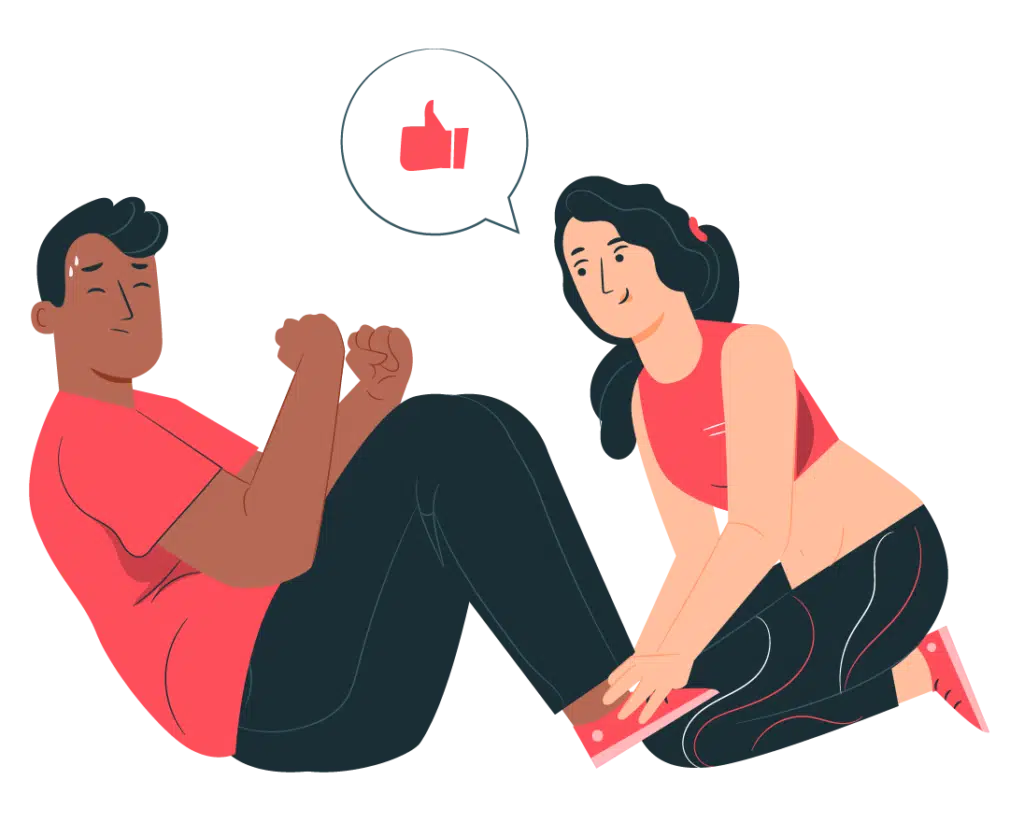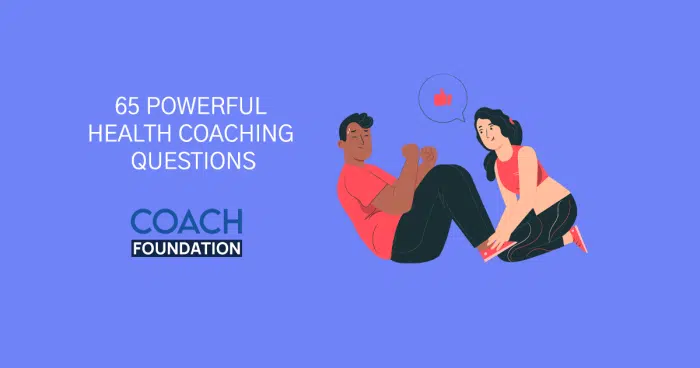Blog » Fundamentals of Coaching » 65 Powerful Health Coaching Questions
65 Powerful Health Coaching Questions
A health coach is a wellness professional who helps people make lifestyle changes that improve their overall health and well-being. Unlike other healthcare providers, health coaches take a holistic approach to care, encompassing all aspects of an individual’s life, from diet and exercise to stress management and relationships.

Health coaches work with their clients to set realistic goals and develop actionable plans for achieving them. They also provide support and accountability throughout the process, helping their clients to stay on track and make lasting changes. Ultimately, the goal of a health coach is to help their clients lead happier, healthier lives. This can involve creating personalized nutrition and exercise plans, providing support and accountability, and offering education on healthy lifestyle habits.
Why Asking the Right Questions is Important
One of the most important skills for a career development coach is the ability to ask the right questions. This may seem like a simple task, but it can be difficult to know what information your client needs in order to make progress.
Asking the right question at the right time can help to uncover hidden interests and talents, set realistic goals, and create a plan of action. In addition, asking questions can also help to build rapport and trust between the coach and the client.
Strong questions allow the coach and client to establish a clear understanding of expectations and attack the coaching process with intention and purpose.
Remember, a successful coaching relationship is built on open communication and a willingness to ask (and answer) difficult questions. Asking questions is a powerful tool for effective coaching, so don’t be afraid to keep the conversation going!
When done correctly, asking questions is a powerful tool that can help coaches effectively guide their clients toward career success.
Best Health Coaching Questions
I’ve been a certified Health coach for years, and one of the most common things I hear from clients is that they want to get on the right track with their health!
Sometimes it can feel like there are no magic words or phrases to fix everything; however when you know what questions, they will lead towards greater clarity in any given situation – even if something isn’t quite right now- then we’ll all be able to find our way back home again together!
As a health coach, you understand the importance of asking the right questions. The right questions can help clients find clarity, identify their goals, and develop a plan of action. Here are 65 powerful health coaching questions to ask your clients:
- What is your current health and wellness status?
- What are your health and wellness goals?
- What is your current diet like?
- What are your thoughts on nutrition?
- What is your current exercise routine?
- What are your thoughts on physical activity?
- What are your stress levels like?
- How do you typically cope with stress?
- What is your sleep quality like?
- How much sleep do you usually get each night?
- Do you have any chronic health conditions?
- Do you have any mental health conditions?
- Are you taking any medications?
- Have you ever tried to make lifestyle changes before? If so, what was successful and what was unsuccessful?
- Why do you want to make these changes now?
- Are you committed to making these changes?
- What might get in the way of making these changes? Let’s brainstorm some ideas for making these changes.
- What would be an ideal outcome for this coaching relationship?
- What is your primary health goal?
- What are your biggest health concerns?
- Why have you been struggling to reach your health goals?
- What has been your experience with diet and exercise in the past?
- What barriers do you face in achieving your health goals?
- What is your biggest motivation for making changes to your diet and lifestyle?
- What would an ideal healthy lifestyle look like for you?
- How ready and willing are you to make changes to your diet and lifestyle?
- What baby steps can you take to begin making changes to your diet and lifestyle?
- How can I best support you in achieving your health goals?
- What challenges or setbacks do you anticipate in achieving your health goals?
- How will you know that you are successful in achieving your health goals?
- What are the potential risks or benefits of making changes to your diet and lifestyle?
- What short-term and long-term benefits can you expect from making changes to your diet and lifestyle?
- What are the possible risks or drawbacks of not making changes to your diet and lifestyle?
- How will making changes to your diet and lifestyle impact other areas of your life?
- Are there any areas of your life where you feel stuck or uncertain?
- What would it mean for you to really take charge of your health?
- How would improved health allow you to live a more fulfilling life?
- If you could wave a magic wand and instantly be at your ideal weight, what would that feel like?
- In what ways would being at your ideal weight improve the quality of your life?
- If you could instantly eliminate all unhealthy foods from your diet, what would that be like for you?
- How confident are you in your ability to make lasting changes to your diet and lifestyle?
- On a scale of 1-10, how important is it for you to achieve your health goal?
- What would be the consequences of not achieving your health goal?
- How committed are you to take action toward achieving your health goal?
- What resources do you need in order to achieve your health goal?
- What are your biggest health concerns?
- Why have you been struggling to reach your health goals?
- What has been your experience with diet and exercise in the past?
- What barriers do you face in achieving your health goals?
- What is your biggest motivation for making changes to your diet and lifestyle?
- What would an ideal healthy lifestyle look like for you?
- How ready and willing are you to make changes to your diet and lifestyle?
- What baby steps can you take to begin making changes to your diet and lifestyle?
- How can I best support you in achieving your health goals?
- What challenges or setbacks do you anticipate in achieving your health goals?
- How will you know that you are successful in achieving your health goals?
- What are the potential risks or benefits of making changes to your diet and lifestyle?
- What short-term and long-term benefits can you expect from making changes to your diet and lifestyle?
- What are the possible risks or drawbacks of not making changes to your diet and lifestyle?
- How will making changes to your diet and lifestyle impact other areas of your life?
- Are there any areas of your life where you feel stuck or uncertain?
- What would it mean for you to really take charge of your health?
- How would improved health allow you to live a more fulfilling life?
- If you could wave a magic wand and instantly be at your ideal weight, what would that feel like?
- In what ways would being at your ideal weight improve the quality of your life?
Conclusion
These 65 health coaching questions are a great starting point for any health coach looking to better understand their clients.
The questions can help you uncover the root causes of your client’s health concerns and provide a plan of action to improve their health.
By asking these questions, coaches can help their clients develop healthy habits and reach their fitness goals. What is your favorite question from this list?
Frequently asked questions
What are the 4 major questions of the coaching structure?
There are four major questions that coaches should ask their clients. These questions help to establish trust, identify goals, and create a plan for achieving those goals.
The first question is “What do you want to achieve?” This helps the coach to understand the client’s goals and what they are hoping to accomplish.
The second question is “What is your ideal outcome?” This helps the coach to understand what the client’s ideal result would be.
The third question is “What are your options?” This helps the coach to identify different options for achieving the client’s goals.
The fourth question is “What is your preferred option?” This helps the coach to understand which option the client prefers and why.
Asking these questions will help coaches to better understand their clients and create a plan that will help them achieve their desired results.
What are some powerful questions?
As a health coach, one of your most important roles is to help your clients find answers to difficult questions.
Some powerful questions you can ask include: “What are your health goals?”, “What are your biggest obstacles to achieving those goals?”, “How motivated are you to make changes?”, “What would it mean for you to reach your goals?”, “What are your deepest fears or concerns about making changes?”.
Asking probing questions like these can help you get to the root of your client’s challenges and better understand their needs. By taking the time to truly understand your client’s situation, you can develop a more targeted and effective plan to help them reach their desired health outcomes.
What should I discuss during the coaching session?
A health coaching session should be tailored to the needs of the individual, but there are some general topics that can be covered to help the person make healthy lifestyle changes.
First, it is important to discuss what the person’s health goals are and how they can be achieved. This may involve setting realistic goals and developing a plan for making healthier choices in diet and physical activity.
It is also important to explore any barriers that may prevent the person from achieving their goals. This may include discussing stressors or triggers that lead to unhealthy behaviors.
Finally, it is helpful to provide resources and encouragement to help the person maintain their motivation and commitment to making lasting changes. By covering these topics, a health coaching session can be a valuable tool for helping someone achieve their health goals.


ABOUT SAI BLACKBYRN
I’m Sai Blackbyrn, better known as “The Coach’s Mentor.” I help Coaches like you establish their business online. My system is simple: close more clients at higher fees. You can take advantage of technology, and use it as a catalyst to grow your coaching business in a matter of weeks; not months, not years. It’s easier than you think.
AS SEEN ON
0 Comment